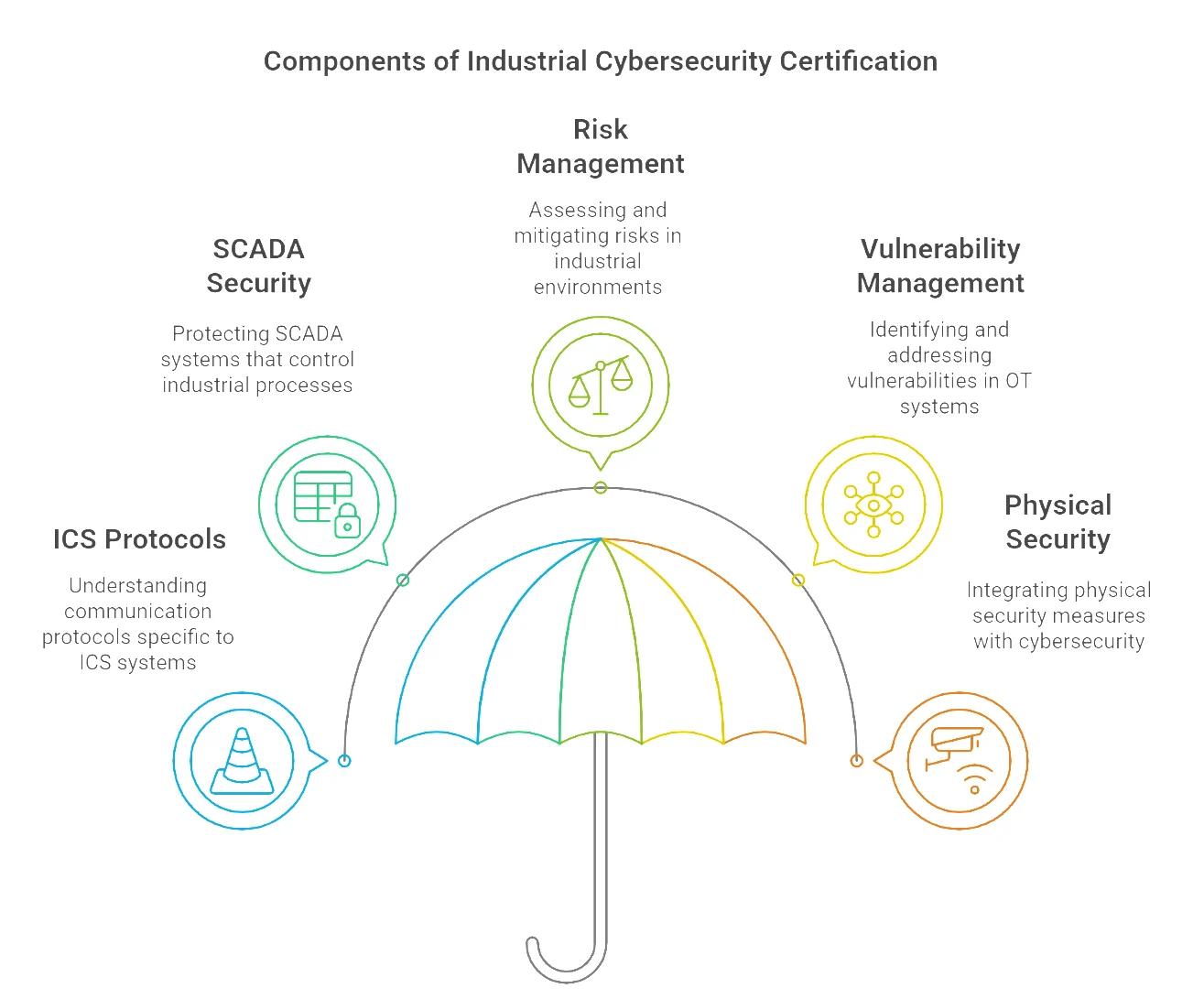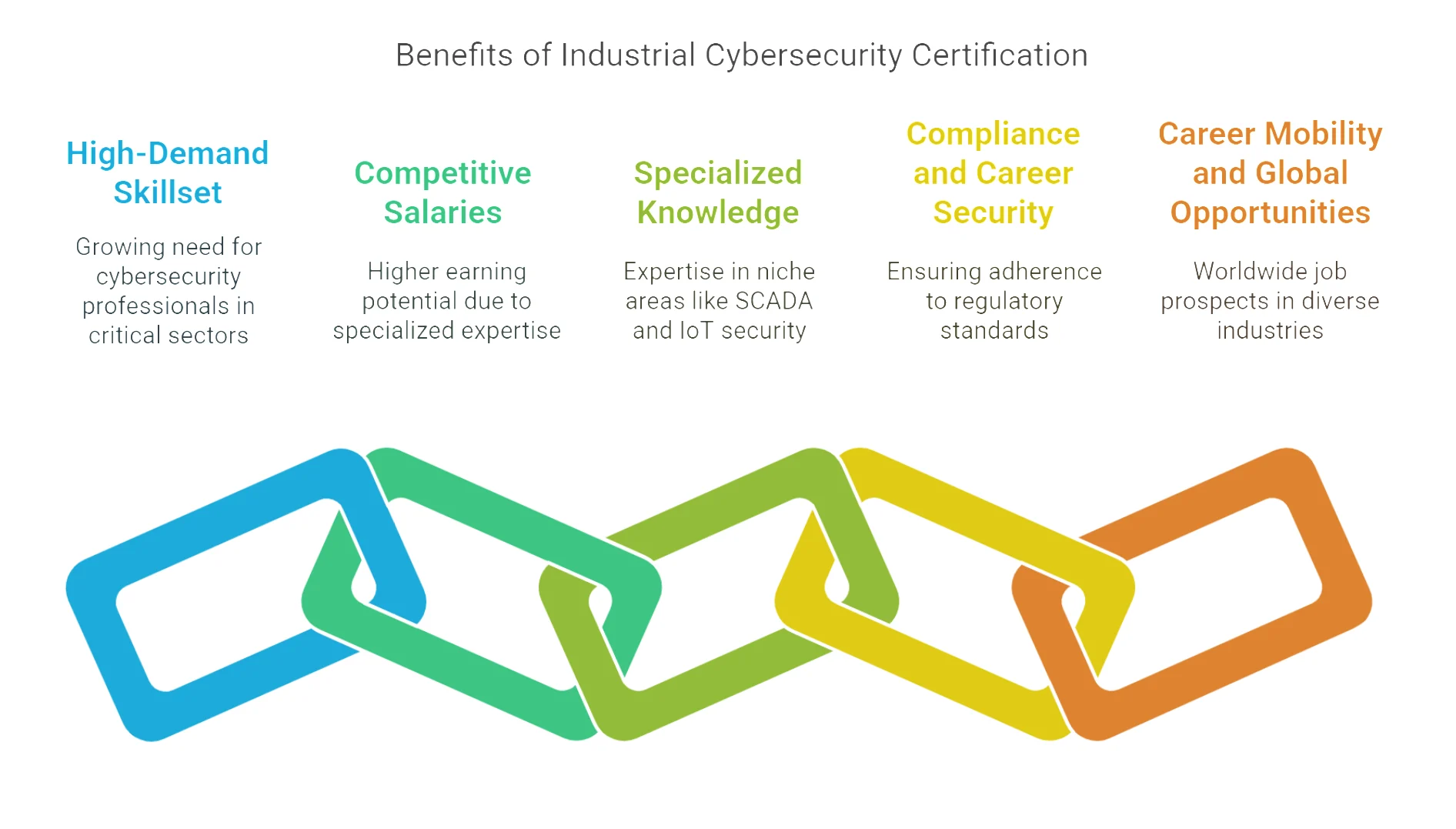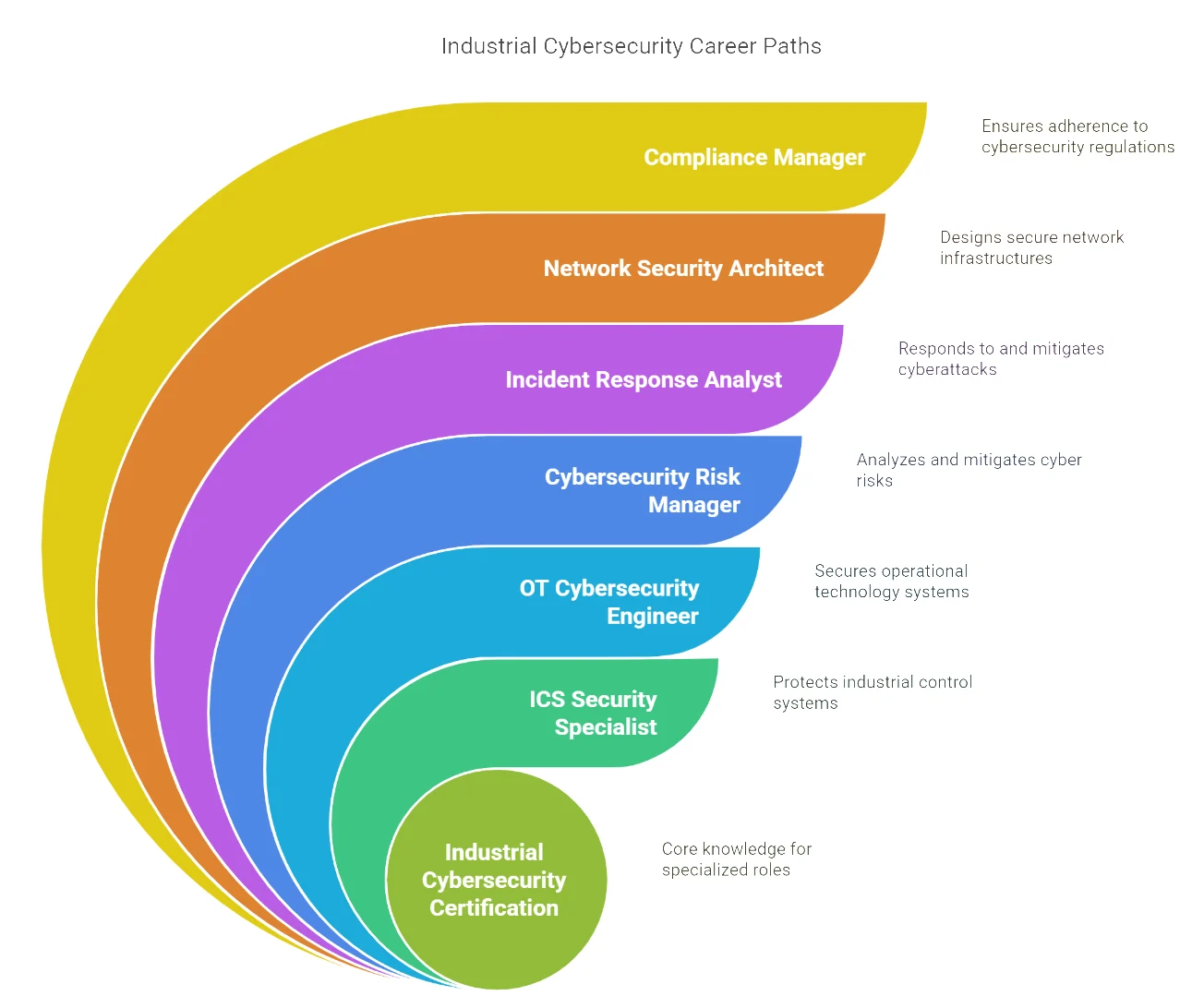Table of Contents
- What is an Industrial Cybersecurity Certification?
- Benefits of Industrial Cybersecurity Certification
- Jobs with an Industrial Cybersecurity Certification
- Enhancing Industrial Cybersecurity Certification with ACSMI
- Comparing CertificationsFAQ
- 1. Why is an industrial cybersecurity certification important?
- 2. What jobs can I get with this certification?
- 3. How much time does it take to earn an industrial cybersecurity certification?
- 4. Do I need additional training after earning this certification?
- 5. Are there prerequisites for these certifications?
- Final Thoughts
The increasing prevalence of cyber threats targeting industrial networks and operational technologies (OT) has created an urgent need for skilled cybersecurity professionals. As industries such as manufacturing, energy, transportation, and healthcare digitize their operations, they become more vulnerable to cyberattacks. These attacks can disrupt critical operations, damage infrastructure, and compromise sensitive data. Cyber Tech Trends continue to highlight the evolving nature of these threats and the innovative solutions being developed to counter them.
The rise in cyber threats has made industrial cybersecurity a critical field, with many organizations now focusing on safeguarding industrial control systems (ICS), Supervisory Control and Data Acquisition (SCADA) systems, and other essential OT networks. For professionals looking to enter or specialize in this field, pursuing an industrial cybersecurity certification is an excellent way to gain the knowledge, practical skills, and credentials needed to succeed in this fast-growing industry. Whether you’re new to cybersecurity or looking to specialize, an industrial cybersecurity certification opens doors to a variety of rewarding career paths while helping you protect vital systems that support modern infrastructure.
What is an Industrial Cybersecurity Certification?
An industrial cybersecurity certification validates your expertise in securing critical infrastructure, ICS, and OT networks that are increasingly targeted by cyber threats. This type of certification focuses on the unique challenges posed by industrial systems, including the integration of IT systems with OT environments and the protection of critical assets like electrical grids, water treatment plants, and manufacturing lines.

Certifications in this field typically cover topics such as:
- ICS protocols: Understanding the communication protocols specific to ICS systems (e.g., Modbus, DNP3).
- SCADA security: Protecting SCADA systems that control and monitor industrial processes.
- Risk management: Assessing and mitigating risks in industrial environments.
- Vulnerability management: Identifying and addressing vulnerabilities in OT systems to prevent exploitation.
- Physical security: Integrating physical security measures with cybersecurity to protect industrial facilities.
By obtaining an industrial cybersecurity certification, professionals gain the ability to detect vulnerabilities, respond to cyber incidents, and ensure the continuity of essential services and operations.
Benefits of Industrial Cybersecurity Certification
Earning an industrial cybersecurity certification offers a variety of benefits that enhance your professional profile and increase your career prospects in this high-demand field. Below are some of the key advantages:

1. High-Demand Skillset
Industries relying on critical infrastructure are increasingly being targeted by cybercriminals. Certified professionals are in high demand to safeguard organizations in sectors like energy, healthcare, transportation, and manufacturing. This demand for skilled professionals is expected to continue growing as the integration of IT and OT systems becomes more widespread.
Obtaining an industrial cybersecurity certification positions you to meet this demand and make a real impact in protecting critical systems. You will be equipped with the tools and knowledge to defend against threats that can disrupt operations and compromise public safety.
2. Competitive Salaries
As organizations face the growing risk of cyberattacks, the need for skilled cybersecurity professionals with specialized knowledge in industrial environments has skyrocketed. Professionals with an industrial cybersecurity certification can expect to command competitive salaries, with starting salaries often around $80,000 per year and potential for significant growth as they gain experience and expertise.
The increasing importance of securing industrial networks and systems means that organizations are willing to pay a premium for certified professionals who can help safeguard their operations. These high-paying opportunities are available in various sectors, including government, defense, and private industries.
3. Specialized Knowledge
Industrial cybersecurity certification focuses on niche areas that are not covered by general IT cybersecurity training. These certifications equip professionals with specialized knowledge in areas such as safety-critical systems, ICS-specific policies, and critical asset risk management.
For example, professionals learn how to protect systems like SCADA and Industrial IoT devices—both of which are central to managing real-time operations in industries such as energy, water supply, and transportation. This specialized expertise makes you a valuable asset, capable of solving unique cybersecurity challenges that others may not be prepared for.
4. Compliance and Career Security
With increasing regulatory requirements, particularly in sectors like energy, transportation, and healthcare, governments and regulatory bodies are enforcing stricter cybersecurity frameworks. Laws like NERC CIP (North American Electric Reliability Corporation Critical Infrastructure Protection) and ISO/IEC 27001 require industries to comply with robust security standards to protect critical systems and data.
Industrial cybersecurity certification ensures that you have the necessary skills to help organizations comply with these standards and avoid penalties. By understanding and implementing compliance strategies, you become an indispensable asset to any organization.
5. Career Mobility and Global Opportunities
Cybersecurity within industrial settings is not only a priority in Malaysia or Southeast Asia but also a global concern. As more industries adopt digital technologies, Security Technology Key Trends highlight the growing demand for skilled industrial cybersecurity professionals worldwide. Certification in industrial cybersecurity opens doors to job opportunities in global markets, allowing you to work across regions and industries. Whether you’re looking to move internationally or work across diverse sectors, a certification ensures that your skills are recognized and valued worldwide.
Jobs with an Industrial Cybersecurity Certification
Earning an industrial cybersecurity certification opens the door to specialized roles in the cybersecurity field. These roles focus on safeguarding critical infrastructure and operational technologies from evolving cyber threats. Here are some of the top positions that professionals can pursue after earning an industrial cybersecurity certification:

1. Industrial Control Systems (ICS) Security Specialist
ICS Security Specialists are responsible for protecting industrial control systems and SCADA platforms from cyber threats. This role involves:
- Ensuring secure configurations for ICS systems to prevent unauthorized access.
- Detecting and responding to cyber intrusions quickly and effectively.
- Preventing system malfunctions that could result from cyber threats.
The certification equips ICS Security Specialists with the knowledge needed to maintain the security and integrity of mission-critical systems, ensuring their safe operation.
2. OT Cybersecurity Engineer
OT Cybersecurity Engineers design and implement secure operational environments for industrial facilities. These engineers focus on securing OT systems such as production lines and sensors. Key responsibilities include:
- Assessing risks and vulnerabilities within OT systems.
- Implementing robust security measures to prevent cyber threats.
- Aligning security measures with compliance requirements to protect critical industrial assets.
This role is ideal for professionals who are passionate about integrating cutting-edge technology with real-world industrial applications to secure OT environments.
3. Cybersecurity Risk Manager
Cybersecurity Risk Managers analyze the unique risk landscape of OT environments. This role involves evaluating vulnerabilities, implementing risk mitigation strategies, and ensuring the continuity of operations during cyber incidents. Specific duties include:
- Prioritizing vulnerabilities and risk management strategies for OT systems.
- Developing contingency plans that minimize downtime and production disruptions during cyber breaches.
- Working with internal teams to ensure compliance and secure operations.
These professionals are essential in balancing safety with cybersecurity within industrial environments.
4. Incident Response Analyst
Incident Response Analysts act as the first line of defense in case of a cybersecurity breach. They are tasked with:
- Containing and mitigating cyberattacks before they affect critical systems.
- Analyzing attack vectors and repairing vulnerabilities to prevent future incidents.
- Conducting post-incident reviews to improve system resilience.
The certification ensures Incident Response Analysts are prepared to act swiftly under pressure, minimizing damage and reducing recovery times for industrial operations.
5. Network Security Architect (Industrial Sector)
Network Security Architects design and implement secure network infrastructures for industrial environments. They focus on ensuring that OT systems are protected from both external and internal threats. Key responsibilities include:
- Designing resilient networks to withstand cyber threats.
- Auditing network structures and recommending improvements.
- Integrating security measures into complex industrial networks.
These professionals are integral in building robust network security architectures that keep critical industrial systems safe from attack.
6. Compliance Manager (Industrial Environments)
Compliance Managers ensure that industrial organizations adhere to cybersecurity regulations and standards. They are responsible for:
- Interpreting and applying cybersecurity regulations like NERC CIP and ISA/IEC 62443.
- Creating procedures to ensure compliance and avoid penalties.
- Fostering a culture of accountability in relation to cybersecurity policies and practices.
Compliance Managers help organizations avoid legal consequences while demonstrating a commitment to protecting critical infrastructure.
Enhancing Industrial Cybersecurity Certification with ACSMI
While pursuing an industrial cybersecurity certification is an excellent starting point, pairing it with ACSMI’s advanced certification training can greatly enhance your skill set. ACSMI provides over 400 modules covering niche areas like Industrial IoT security, Security Management Cyber Threats, risk analytics, and incident forensics.
With hands-on labs and simulations that mimic real-world OT challenges, ACSMI ensures you gain the practical expertise needed to stand out in the competitive cybersecurity job market. The comprehensive curriculum prepares you for the complexities of protecting modern industrial environments, ensuring you’re ready to address both technical and compliance challenges.
Comparing Certifications
When considering which certification to pursue, it’s essential to compare options based on the type of role you wish to pursue, the industry requirements, and the level of expertise you aim to achieve. ACSMI’s modules and hands-on training ensure you can effectively complement the knowledge gained from other certifications, such as CISSP, CISM, or CEH, by enhancing your understanding of industrial-specific cybersecurity challenges.
Final Thoughts
Industrial cybersecurity is a fast-growing field that plays a crucial role in protecting the infrastructure that supports daily life. Earning an industrial cybersecurity certification opens the door to a rewarding career, where you can safeguard critical systems from evolving cyber threats. By pairing your certification with advanced training from platforms like ACSMI, you’ll be well-equipped to take on the challenges of today’s industrial cybersecurity landscape.
Start your certification today and embark on a journey to protect the backbone of the global economy.
Frequently Asked Questions (FAQs) About Industrial Cybersecurity Certification
1. Why is an industrial cybersecurity certification important?
Industrial cybersecurity certifications focus on securing operational technologies and ICS systems, which are vulnerable to unique cyber threats. These certifications prepare professionals to safeguard critical infrastructure that modern society relies on.
2. What jobs can I get with this certification?
After earning an industrial cybersecurity certification, you can pursue roles like ICS Security Specialist, OT Cybersecurity Engineer, Cybersecurity Risk Manager, Incident Response Analyst, and Network Security Architect.
3. How much time does it take to earn an industrial cybersecurity certification?
Most certification programs take 3-6 months to complete, depending on the course depth and the learner’s pace. Some certifications may also offer accelerated or self-paced options.
4. Do I need additional training after earning this certification?
While certifications like ACSMI offer advanced learning, continuous education is essential. To stay competitive, pursuing additional certifications and specialized training is important.
5. Are there prerequisites for these certifications?
Entry-level certifications may not require specific prerequisites, but basic knowledge of IT and networking can be beneficial for those starting in industrial cybersecurity.

Leave a Reply